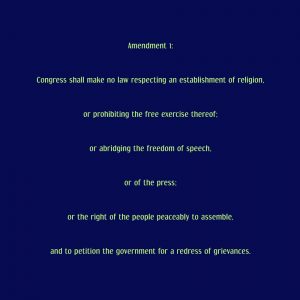Censorship on the Internet

Years ago I had a blogspot blog. I still have that blog in fact. I use it for bs and testing, nothing more. But I used to blog every day on it.
One day, not sure exactly when, but I came across a picture of a bathing suit that Muslim women wear. This thing looked hot and not hot in a sexy kind of way – hot in a sweat to death kind of way. I made a post with a picture of the bathing suit, made a comment that stated this kind of bathing suit would trigger my claustrophobia and I could never wear it. Nothing more.
My blogspot site – the whole site, not just a post – was taken down, within an hour of publishing that last post. Censorship on the internet! Not.
I was stunned. I couldn’t figure out why the heck the whole blog was deleted. I appealed, got the blog back, but they couldn’t restore the content on (to which I called bs on, but oh well.) I never got an explanation as to why the blog got deleted.
I’m in IT. I have a good understanding about how things work, and how they can fail for no apparent reason and so I make backups. I happened to have a backup of that blogspot blog, except for that last post. I put the blog back up under my own domain on my own site using WordPress and never looked back.
Censorship on the Internet and the First Amendment
The First Amendment states:
Amendment I
Congress shall make no law respecting an establishment of religion, or prohibiting the free exercise thereof; or abridging the freedom of speech, or of the press; or the right of the people peaceably to assemble, and to petition the government for a redress of grievances.
First Amendment: An Overview
The First Amendment of the United States Constitution protects the right to freedom of religion and freedom of expression from government interference. It prohibits any laws that establish a national religion, impede the free exercise of religion, abridge the freedom of speech, infringe upon the freedom of the press, interfere with the right to peaceably assemble, or prohibit citizens from petitioning for a governmental redress of grievances. It was adopted into the Bill of Rights in 1791. The Supreme Court interprets the extent of the protection afforded to these rights.
The First Amendment has been interpreted by the Court as applying to the entire federal government even though it is only expressly applicable to Congress. Furthermore, the Court has interpreted the Due Process Clause of the Fourteenth Amendment as protecting the rights in the First Amendment from interference by state governments.
https://www.law.cornell.edu/wex/first_amendment
The First Amendment applies to the government. The government cannot restrict you, and it doesn’t mean there can’t be consequences for what you say or write. If I yell “hijack” on a plane, guess what’s going to happen to me?
The First Amendment doesn’t apply to private businesses, private entities or your boss.
Censorship by the government is unconstitutional. It doesn’t apply to businesses, private entities or your boss.
If you use a third party site like Facebook for your content, you are bound by their rules and you’re basically at their mercy. The first amendment doesn’t apply to private entities. Facebook can remove your stuff at the drop of a hat – you agree to it when you first sign up on THEIR site. It’s not your site. It’s theirs. They reserve the right to do whatever they wish on their site.
In fact, read the terms of service that you agree to when signing up. You agree to letting them delete your content.
That little disclaimer doesn’t have to be there, though. It just makes it easier when a user comes in screaming that a site deleted their content. You agreed. Here’s the link. Oh, you didn’t read it? Oh well. Have a good day.
It only matters that you checked the box saying you agree to the TOS, lol. It’s up to you to read it.
This is how it works for any site you use on the web.
Search engines are the same way. They don’t have to list your site. If they don’t, you can’t sue them for not doing so. If your site isn’t listed, it’s because you haven’t applied search engine optimization and even then – there are no guarantees.
I get a big kick out of folks whining about “shadow banning.” It’s not shadow banning. You’re simply at the mercy of an algorithm, and algorithms don’t care who you are or what you believe.
It is easy to manipulate search engines – if you know how. A bunch of folks on the internet worked together to make the phrase “miserable failure” bring up a picture of George W. Bush on Google years ago. It’s called a Google bomb. Read up on it here: Google Bomb
(It’s one of the reasons Google has evolved the way it has and makes it more difficult to rank in the search engine.)
Looks like the same thing was done with the term idiot. Republicans have their panties in a twist over it – as evidenced by hearings this week, who seem to think there is some liberal at Google making it happen. Nope. It’s a bunch of users like you and I doing it.
It’s when the government gets involved is when you have to worry.
Internet censorship and government
You must be logged in to post a comment.